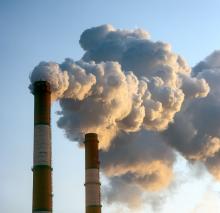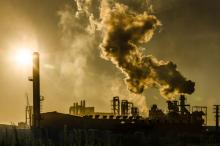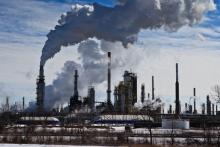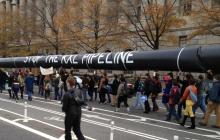environmental protection agency

I was raised bilingual and bicultural in New Mexico, the state with the highest percentage of Latino population, nearly 50 percent. In addition to working as an environmental advocate, I am also a member of the rising Latino generation, the fastest growing young demographic in the country. Fifty thousand Latinos turn 18 every month. To put this in perspective, Pew Research Center estimates that by mid-century, Latinos will comprise nearly 30 percent of the U.S. population.
When I was 18, I had just graduated from high school with several years of soccer at Santa Fe’s 7,000-foot elevation under my belt. I was on my way to college, and would go on to complete a master’s of science in an interdisciplinary environmental sciences program.
What my experiences do not include are those that are far too common among Latino 18-year-olds who are disproportionately affected by carbon pollution. Carbon pollution contributes directly to climate change, in turn endangering Latinos due to the resulting health and environmental repercussions. One expected climate impact in the U.S. is more smog in areas with poor air quality, translating to more asthma attacks for our young people. In fact, the Latino community is one of the hardest hit: Hispanic children are nearly two times as likely to be hospitalized for asthma as white children. Other illnesses related to poor air quality, such as chronic bronchitis, are also prevalent within Latino communities, yet nearly half of all Latinos in the U.S. live in counties that often violate ground-level pollution standards.

Editor’s Note: This post contains two of many testimonies given at an Environmental Protection Agency listening session at EPA headquarters in Washington, D.C. The EPA held sessions in 11 regional offices across the country to allow the public to comment on the agency’s plans to begin regulating carbon dioxide emissions — one of the heat-trapping pollutants that contributes to climate change — from existing coal and natural gas-fired power plants. The public was invited to share up to three minutes of spoken testimony to an EPA panel for the agency’s consideration.
My name is Dr. Jalonne L. White-Newsome and I am a federal policy analyst at WE ACT for Environmental Justice, a 25-year-old community based environmental justice organization based in Harlem, N.Y. However, I work out of our Washington, D.C. office, mostly engaging in federal policy. Although I am in a different location, WE ACT D.C. has the same mission: to build healthy communities by insuring all voices help shape environmental policy and practices so that they are fair.
As a public health researcher who has seen the impacts of temperature, air pollution, and climate changes on urban-dwelling seniors in low income communities of color, I am clear about the need for and the importance of the testimony that I, and hopefully other environmental justice organizations, will offer here today. While three minutes is not a lot of time, I do have a couple of "calls to action" to uplift as you continue your work:
- Recognize the deficiency.
- Recognize the cumulative impacts.

In the Hebrew and Christian scriptures, there is a Psalm that proclaims: “the earth is the Lord’s and everything in it, the world, and all who live in it” (Psalm 24:1). There is no part of this world that God is not aware of, cannot lay claim to, and does not rule. Christians affirm that as people of faith we’re called to be stewards over creation, answering one day for how we’ve treated the earth.
And part of that stewardship means understanding how this world works and what it needs in order to thrive. Unfortunately the din of our political ideologies has too often drowned out the biblical calling to care for creation.
In Texas, the State Board of Education will recommend new textbooks for all its students—and because it has such a large population, what they decide could determine what students in other states learn about science. There are several ideologues submitting textbook critiques to the board and their reviews will factor into each book’s overall score and likelihood of being approved by the school board. These ideologues could block the use of textbooks that teach the reality of climate change for the whole country’s public school students.

This week the EPA is holding the last few of its listening sessions around the country — 11 in total by the end of the week – to hear what Americans have to say about the EPA’s plans to tackle climate change.
These listening sessions are our chance to give the EPA our comments in person — everyone can register for a three-minute testimony spot — about the agency’s upcoming rule on carbon pollution from existing power plants.

During the government shutdown, some cuts have caught the public’s attention more than others. And some people are rejoicing over the cuts faced by the Environmental Protection Agency and other environmental agencies. But the shutdown of our environmental programs is affecting people’s lives in ways that might surprise you.
1. National Parks closures are more than an inconvenience
In some National Parks across the country, employees are stranded. Employees who live on park grounds, like park rangers and concession workers, have no work or pay, and because the parks are closed, they’re not even allowed to take solace in the trails that surround them. And in at least one case, they don’t have any food. About 2,200 employees – 1,800 of them concession workers – are stranded in Grand Canyon National Park. A local food bank has started making deliveries, because those people are going hungry and without pay.

This Wednesday on Capitol Hill, the House subcommittee on Energy and Power held a hearing to discuss the Obama administration’s climate change policies and activities. The policies in question were the president’s Climate Action Plan, announced this summer, which has three main pillars:
- cutting carbon emissions,
- leading international efforts to combat climate change, and
- preparing the United States for climate change impacts.
The Environmental Protection Agency Administrator Gina McCarthy and the Energy Secretary Ernest Moniz were present to answer questions about the president’s plan, which works with new and existing programs in both agencies to reduce our climate change pollution and increase our resilience to climate change. Some of the programs are required by a recent Supreme Court decision that labeled carbon dioxide a pollutant; others, as Moniz pointed out, would happen to carry the benefit of energy efficiency.
For some members of Congress, this is a problem because they do not wish to cede any ground to the executive. For others, it is a problem simply because they do not wish to do anything about climate change.
Climate change is expected to take a turn for the better following the Senate's approval of Gina McCarthy to serve as the new head of the Environmental Protection Agency. McCarthy won over the Senate on July 18 in a 59-to-40 vote. The New York Times reports:
The president told Ms. McCarthy that his environmental and presidential legacy would be incomplete without a serious effort to address climate change.
Read more here.

Forget about future generations – climate change is already hitting poor people around the world, not to mention contributing to natural disasters in the U.S. from New York City to Arizona. Apparently that’s not enough for some members of Congress, who have chosen to use their authority to try to block any and all attempts to do something about the problem.
Earlier this month, President Barack Obama announced a major, comprehensive plan of action on climate change – changes that would do much to protect human health, the poor, and future generations by mitigating some of the worst impacts of climate change. A central part of the plan is to address climate pollution at its largest source: coal-fired power plants.
Unfortunately, many members of Congress are already taking steps to decry the president’s plan as a “war” – on coal, on American energy, and yes, even on America itself. Leaders from John Boehner to Michele Bachmann to Joe Manchin have made it pretty clear that they view attempts to care for creation as an assault on our country.
When the ExxonMobil Pegasus pipeline split open in late March it spilled 210,000 gallons of oil into a small Arkansas town. The spill galvanized opponents of the Keystone XL Pipeline, who cited its planned path through major rivers and aquifers. Activists say TransCanada, which would build and operate the pipeline, underestimate the size of potential spills.
"I don't agree with people who say a spill into the aquifer will ruin the whole aquifer. It would ruin a very small piece, but it's important if that's your small piece," John Stansbury, a University of Nebraska professor of environmental and water resources engineering. "But if it got into a major river, it could create a plume hundreds of miles long."
Read more here.

Last week, concentrations of carbon dioxide in the atmosphere reached 400 parts per million – nearly 15 percent over what many scientists estimate is a safe level. Amid this and other crises in creation, the Environmental Protection Agency needs a strong leader to navigate the complex policy and economic situation that governs environmental policy.
In March, In March, President Barack Obama nominated Gina McCarthy to lead the EPA. At the time, many regarded her as a shoo-in, as she has held top posts under Republican governors, was endorsed by many in the energy industry, and has acted as assistant administrator of the EPA under President Obama since 2009.
It was surprising, then, when all eight Republican members of the Senate’s Environment and Public Works Committee decided to boycott McCarthy’s nomination hearing. This surprise decision, which effectively canceled the vote, was part of a longer-term pattern of obstruction and partisanship on once-routine matters.
In the face of such unprecedented risk to human health and well-being, many were surprised that senators tasked with studying issues of clean air, clean water, and similar issues put ideology ahead of fairness in obstructing the vote. Sen. David Vitter, the leader of the obstructionist group, said it best himself in 2005 when discussing judicial appointments: “I think that every nominee deserves a vote. It’s a matter of fairness.”
Climate defenders should celebrate the news that Obama is continuing to delay signing a permit that would allow foreign-owned mining company TransCanada a permit to build the northern route of the highly controversial Keystone XL pipeline across the U.S.
After the State Department once again released a highly flawed assessment in March and the Environmental Protection Agency called it “deeply flawed” (again), we see that grassroots pressure is creating an effective roadblock on this incredibly dangerous path.
From Reuters:
The Obama administration is unlikely to make a decision on the Canada-to-Nebraska Keystone XL pipeline until late this year as it painstakingly weighs the project’s impact on the environment and on energy security, a U.S. official and analysts said on Friday.
The decision may not be made until November, December or even early 2014, said a U.S. official … who did not want to be named given the sensitive nature of the project.
Analysts agreed that a decision would not be made by this summer as the State Department had suggested when it issued an environmental review on the pipeline on March 1.

In the midst of our celebration of Earth Day, government agencies continued the debate over the Keystone XL Pipeline, which would transport oil from Canada’s tar sands across the United States into the gulf coast of Texas to be refined and shipped elsewhere. The State Department, tasked with reviewing the pipeline’s environmental impact, gave it a tentative pass a month and a half ago.
Activists across the country sprang into action to oppose the pipeline, citing its contribution to climate change and risk of oil spills. Supporters of the pipeline shot back, denying the climate impact of the pipeline and claiming that the oil would be produced whether or not the Keystone project moved forward.
The Environmental Protection Agency responded yesterday, calling into question the State Department’s findings and echoing the concerns of environmental activists everywhere: the Keystone Pipeline would be greatly exacerbate climate change.
WOW! More than 3,000 of you submitted comments to the Environmental Protection Agency regarding their proposed carbon regulation. Thank you for your heartfelt letters and remarks in support of this rule -- read some of them below! Why are people supporting the EPA carbon rule? Faith, health, science, family, you name it. Below you’ll find some samples from Sojourners members.
“Life, especially protecting our unborn children and infants, should not be a ‘matter of party or economic commodity.’ Protecting life and providing the opportunity for abundant life must be a matter of principal and morality.” – The Rev. Mitch Hescox, delivering a testimony on “A Christian Perspective on the Costs of Mercury to Human Health and Wellbeing” before the Energy and Power Subcommittee for the House of Representatives.

After years of opposition from coal industry lobbyists, the Environmental Protection Agency has issued the first national standards for mercury and air toxin pollution.
The standards will slash emissions of these dangerous pollutants by relying on widely available, proven pollution controls that are already in use at more than half of the nation’s coal-fired power plants.
The EPA estimates that the new safeguards will prevent as many as 11,000 premature deaths and 4,700 heart attacks each year. The standards also will help America’s children grow up healthier — preventing 130,000 cases of childhood asthma and about 6,300 fewer cases of acute bronchitis among children each year.
On November 6, I will join Jim Wallis, staff members from Sojourners, and 15,000 others in Washington, D.C.'s Lafayette Park to tell President Obama to stop the Keystone XL pipeline project.
If approved by the Obama administration, the pipeline would transport non-conventional tar sands oil from Alberta, Canada, 1,700 miles south -- through the American Heartland -- to the oil refineries in Texas on the Gulf of Mexico.
Did anyone else get the feeling, as we watched weather reporters wave their arms frantically in swirling motions across oversized maps of the eastern seaboard -- with their eyes bulging as they pushed out whole paragraphs without a single breath for a period -- that this was all hype?
Last weekend, as Irene passed over town after town in the mid-Atlantic, memories of Katrina did not materialize. By the time Irene huffed over New York City on Sunday morning, and the flood of the century was actually just a really big puddle in Battery Park and a floating lifeguard stand in Long Beach, my fear had transformed into complacency. From there I became cynical. By Sunday afternoon I found myself watching the weatherman's bulging eyes as he repeated the mantra of the day: "It's not as bad as we thought it would be, but it's not over." And I thought: "Boy, they'll do anything for ratings."
But it wasn't all hype.